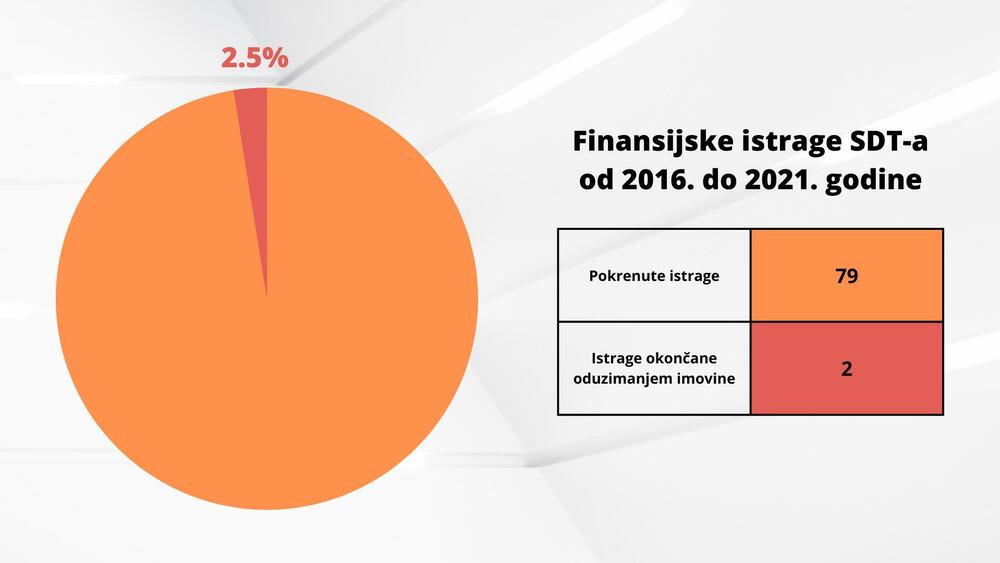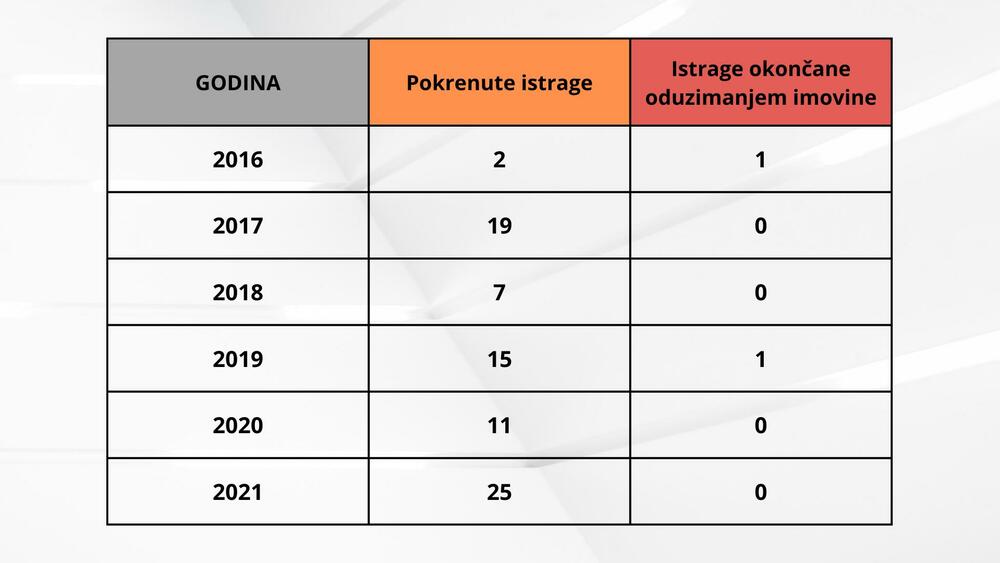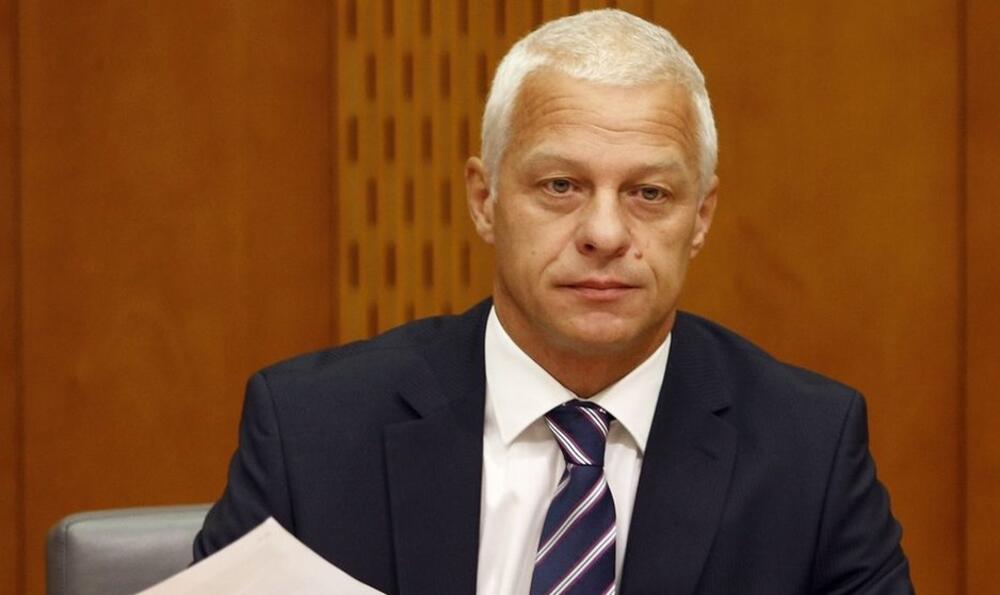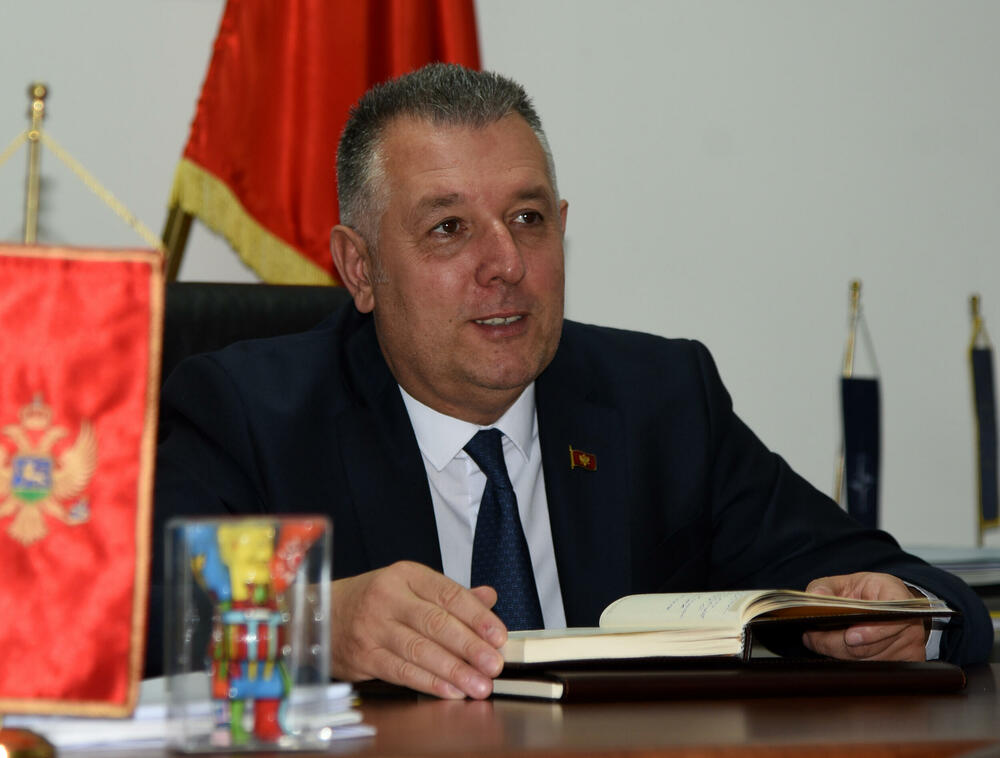In six years, the Special State Prosecutor's Office (SDT) managed to permanently confiscate only two apartments and 3.063 square meters of land, which it proved were acquired through crime. In the same period, 79 financial investigations were initiated, and two were successfully completed.
This is the balance of financial investigations of the SDT, according to the reports of the prosecutor's offices from 2016 to 2021.

The conduct of successful financial investigations, in addition to the inefficiency of the SDT, but also of the entire judicial system, is also prevented by other links in the chain. The readiness of the Police Administration to deal with these problems, as well as other institutions important for the implementation of financial investigations, was also a problem. Thus, Montenegro does not have a Centralized Register of Bank Accounts, nor is the Register of Beneficial Owners available yet, and the data of the State Cadastre is often outdated.

International cooperation was also difficult. During 2019 and 2020, Montenegro did not have access to key international data on suspicious transactions. This happened when the Directorate for the Prevention of Money Laundering and Financing of Terrorism became part of the Police Directorate, so for a year Montenegro was excluded from the Egmont Group - the international association of financial intelligence services, which ensured the worldwide exchange of intelligence data on money laundering.
Well-known regional expert in the fight against corruption, Slovenian Drago Kos, for Center for Investigative Journalism of Montenegro (CIN-CG) says that financial investigations are a basic tool for fighting organized crime and corruption, and that these investigations are much more important than proving a criminal offense and going to prison.

"For a long time, the essence of the fight against crime is not putting people behind bars, but confiscating property and money, that hurts them the most," Kos points out.
Kos points out that the police and prosecutor's office should change their way of acting. They should immediately launch investigations into the flow of money and evidence of ill-gotten gains, instead of usually dealing only with those elements of crimes that prove guilt in a court of law.
The SDT and the High Court in Podgorica rejected CIN-CG's requests for free access to information on financial investigations conducted since 2016. We have not received any decisions approving or rejecting requests for permanent confiscation of property, nor those regarding suspended investigations.
According to the publicly available reports of the SDT, in 2016, almost all decisions on permanently confiscated property were made in the so-called "green mile" case due to drug smuggling. In this case, a 53-square-meter apartment was confiscated from convicted group member Dejan Rovčanin. In that case, land of 3,063 square meters was confiscated.
According to the available data from the SDT, in 2019, an apartment of 193 square meters was also permanently confiscated from Miloš Marović, the son of Svetozar Marović, the fugitive head of the Budva criminal group who was convicted of embezzlement worth millions. However, there is now a dispute over this apartment, because Miloš's former business partner Petar Miloš claims that he lent money to the younger Marović, on the basis of which a mortgage was registered on the very property that was seized.
The protector of property legal interests of Montenegro sued the two, demanding that the contract on the alleged loan of 236.000 euros be annulled, on the basis of which Petar Miloš is now trying to sell the confiscated apartment.
Although the SDT previously claimed in the media that in the so-called "Budva cases" also permanently confiscated the villa in Bečići, in the reports of the prosecutor's office it is not mentioned anywhere that this property of the wife of Svetozar Marović was permanently confiscated. CIN-CG asked for clarifications about the villa, however, SDT did not respond to that inquiry either.
They temporarily take away millions, then return them with compensation
During the years when Milivoje Katnić was at the helm of the SDT, he did not fail to brag about the millions of assets he confiscated, but only temporarily while the court proceedings were ongoing. In all major cases, such as those against Kalić or Šarić, the confiscated property was returned. And not only that, the citizens also paid millions in damages from the budget due to improper maintenance or lost profits of this temporarily confiscated property.
After 2016, in which two financial investigations were launched and assets were permanently confiscated in the "green mile" case, according to the prosecutor's office reports, 2017 financial investigations were launched in 19. There was no permanent confiscation of property, and the SDT requested temporary seizure in eight cases.
In 2018, financial investigations were initiated in seven cases. From the earlier period, there were 20 active financial investigations. They requested the temporary confiscation of property in seven cases. No property was permanently confiscated this year either.
In 2019, financial investigations were initiated in 15 cases, and according to SDT data, there were also 29 financial investigations from previous years. That year, they asked for temporary confiscation of property in six cases, and only Miloš Marović's apartment was permanently confiscated, which was valued at 300.000 euros, which is much less than the damage this group caused to society.
During 2020, financial investigations were initiated in 11 cases and one extension of the existing financial investigation. There were also 32 financial investigations from previous years, two of which were suspended, and assets were temporarily confiscated in 11 cases. There was no permanent confiscation of property.
In 2021, a financial investigation was initiated in 25 cases and an existing one was expanded in one case, and there were also 44 investigations from earlier years. One financial investigation was suspended, and property was temporarily confiscated in four cases. This year too, according to reports, there was no permanent confiscation of property.
The report of the Prosecutorial Council (TS) for 2021 mentions for the first time how long the financial investigations lasted. "Financial investigations lasted a minimum of 15 days, and a maximum of six years, so on average the investigations per person lasted 85 days".
EU seeks results in confiscation of assets
The European Commission (EC) has been warning for years that the situation in the implementation of financial investigations is bad. In the report for 2021, it is pointed out that in Montenegro, the results related to confiscation of property acquired through criminal acts and high-level corruption are very modest.
"It is necessary to improve the balance of achieved results in temporary and permanent confiscation of property and legally binding court decisions in corruption cases," the report says.
The EC requests that the laws related to financial investigations and asset recovery be revised, and that they be harmonized with international standards and practices of the European Union. An integrated approach of all authorities is also required, in order to provide the conditions for establishing a sustainable balance of results in this area.
Negotiation chapters 23 and 24, which refer to judicial reform, the rule of law, the fight against corruption and organized crime, were opened by Montenegro almost nine years ago.
In previous reports of the EC, it is emphasized that the state of the cadastre in Montenegro, whose data is insufficient and partly outdated, represents an obstacle for effective financial investigations. It is also noted that apart from the SDT, basic and senior prosecutors almost never initiate financial investigations. "The practice of financial investigation continues to differ from the practice of the EU and the standards of the Financial Action Task Force (FATF), because it is used only as a way to implement the so-called 'extended confiscation', and not to support the implementation of the criminal investigation itself".
It is also emphasized that international police cooperation, which is crucial in financial investigations, is insufficiently used, and that Montenegro does not have a centralized register of bank accounts, nor a register of real owners, which is a requirement from the fifth EU Directive against money laundering.
"In their absence, the identification of the real owners of private companies and the monitoring of financial transactions continue to take a long time and represent a challenge," the document added.
Miljanić: Cancer of the wounds of Montenegrin institutions
"Financial investigations are a cancer of the wounds of Montenegrin institutions," Zoran Miljanić, the minister without portfolio responsible for the fight against corruption, told CIN-CG. He assesses that so far it has been done sloppily, and that this is one of the main reasons that we have few cases of permanently confiscated property.
According to Miljanić, full coordination of all institutions of the system is necessary in order to successfully conduct financial investigations.

"The essence of the fight against organized crime and corruption is to stop illegal financial flows and confiscate property," the minister emphasizes.
Kos adds that in order for financial investigations to be successful, the registers must function, that everything is updated and in electronic form.
It is not enough that there is a law, there must be someone willing and able to use that law, says Kos.
He adds, the prosecutor's office and the police should be strengthened both numerically and with knowledge, because they have very significant powers that require a lot of work.
"There must be people specialized in this in the police and prosecutor's office who will practically only deal with this, they should be freed from other obligations", Kos assesses.
Miljanić adds that the international community is very willing to provide maximum support in the engagement of experts, because we do not have enough personnel who can carry out this fight.
He explains that, among other things, we have very few financial experts who want to do that work, because the salaries are low.

"If someone in the bank has a much higher salary, why would they do that difficult and risky job", explains the minister.
The National Council for the Fight against Corruption, which should be established soon, will connect all institutions, which should also facilitate the conduct of financial investigations, claims Minister Miljanić.
"The Council will also develop a National Strategy for the fight against corruption. We are one of the few countries in Europe that never had that strategy," he emphasizes.
Drago Kos conveys Slovenian experiences. There, the Constitutional Court annulled the law, because it also provided for retroactive confiscation of property, so the results, even in that country, are not satisfactory.
Our region should follow the examples of the Scandinavian countries, which are quite successful in this regard, concludes Kos. "It is up to the perpetrator to prove where his property came from," he points out.
They are changing the law to seize property without a judgment
Our 2015 Law on Confiscation of Proceeds of Crime provides for the confiscation of all property and money obtained through criminal activity. In addition, all property suspected of having been obtained through criminal acts is confiscated, unless the perpetrator "makes it likely" that it was acquired legally. Property can also be confiscated from family members and related persons.
The Ministry of Justice is working on changes to this law, so that property can be confiscated in the future even without a court ruling, as suggested by the EC. The proposal for the Law on Amendments to the Law on Confiscation of Property Gains from Criminal Activity is in its final stage and its adoption is expected soon.
The Ministry of Justice for CIN-CG did not specify when the Proposal will be completed, stating that they are working on it in accordance with the recommendations of EU experts, in order to obtain a quality law.
15 euros were taken in Bijelo Polje
The High Court in Bijelo Polje has permanently confiscated - 2016 euros from 15 until today. This is written in the response of the President of the Court, Milan Smolović, to the request of CIN-CG on free access to information.
"During the requested period, the security measure of confiscation of 10- and XNUMX-euro banknotes was imposed against the defendant M.LJ., who was found guilty of the criminal offense of unauthorized production, possession and distribution of narcotic drugs and sentenced to one year in prison."
The higher state prosecutor's office in Podgorica has initiated 14 financial investigations in the last few years. From the High Court in Podgorica, they only asked for the permanent confiscation of a 36 square meter apartment in Sveti Stefan.
The TS report points out that in the Podgorica High Prosecutor's Office there are no special departments specialized in the efficient management of financial investigations and financial crime.

Bonus video:




